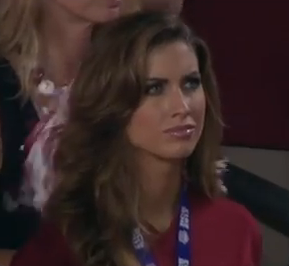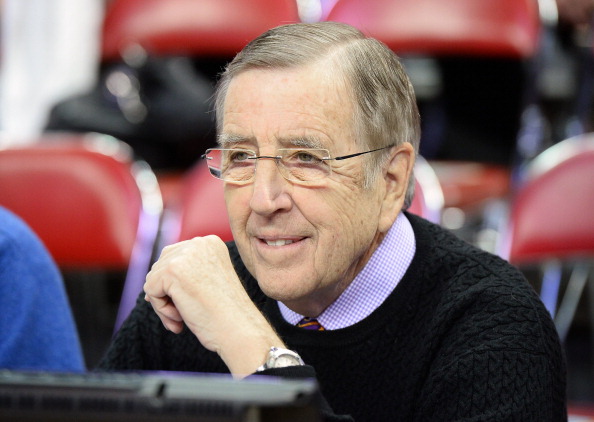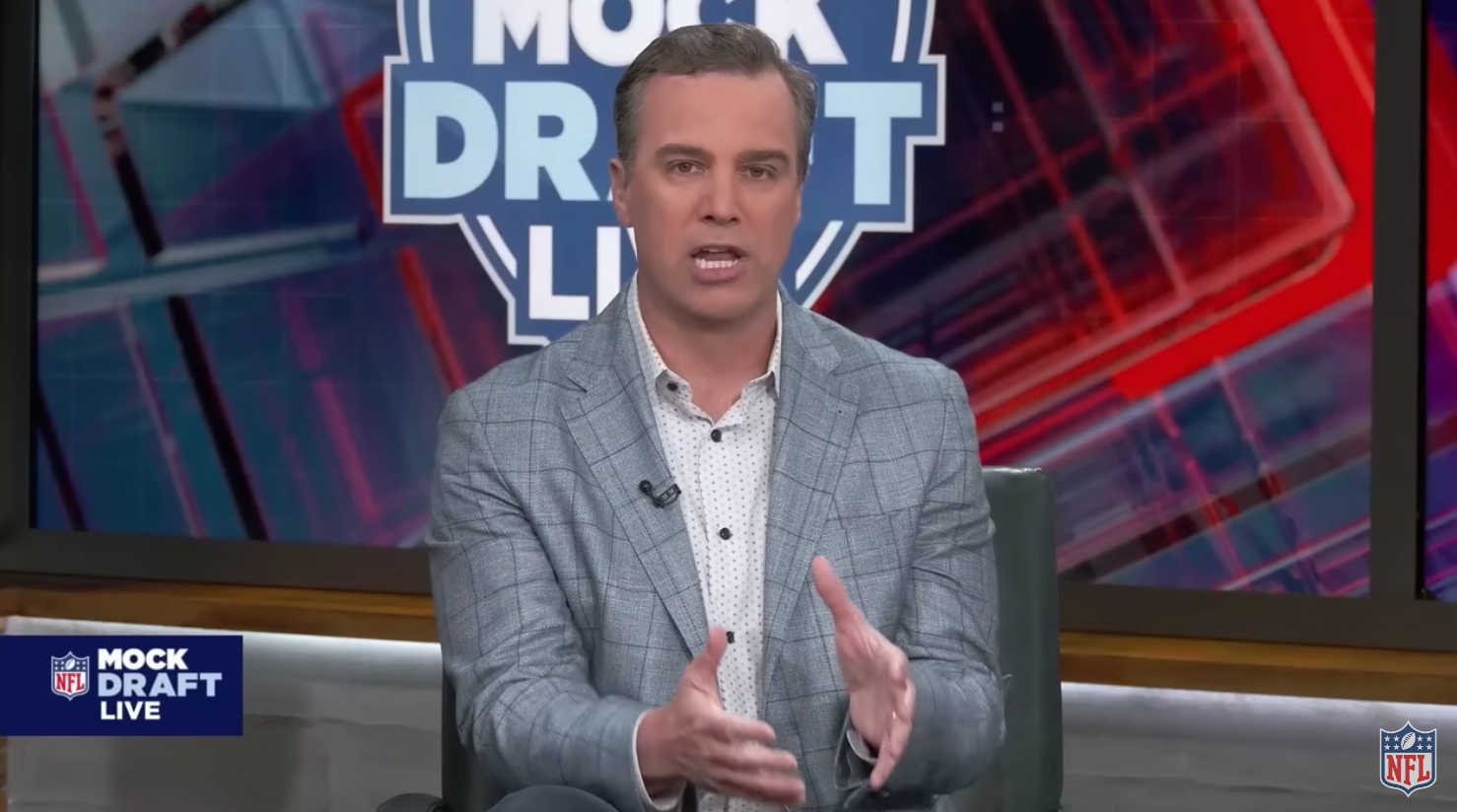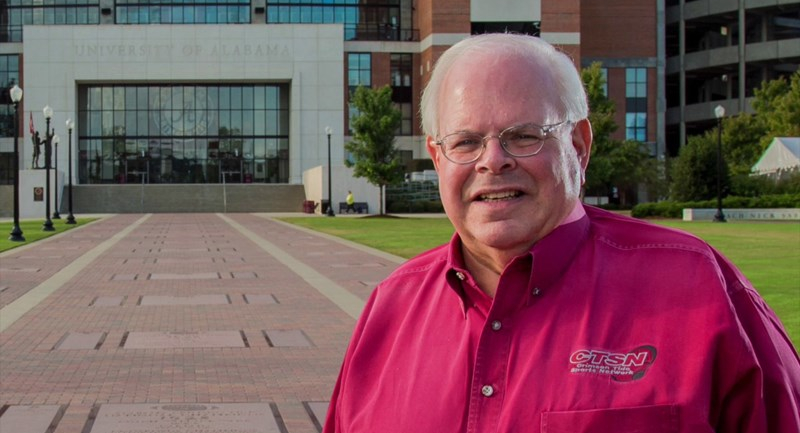“When you’re a quarterback at Alabama — you see that lovely lady there? She does go to Auburn but she also is Miss Alabama and that’s A.J. McCarron’s girlfriend… You quarterbacks, you get all the good-looking women. What a beautiful woman. Wow!” – Brent Musburger on Katherine Webb during the 2013 BCS Championship Game
The 10-year anniversary of a 42-14 blowout more lopsided than the final score suggests and Nick Saban claiming his third national championship at Alabama would be of little note outside Tuscaloosa today if not for a couple of subplots involving girlfriends.
The more famous overshadowed the other, and understandably so. Nine days following Notre Dame’s face-plant in its first title-game opportunity since the 1989 Fiesta Bowl, Deadspin dropped an investigative bombshell that still reverberates a decade later.
The catfishing of Fighting Irish linebacker and Heisman Trophy runner-up Manti Te’o created a media firestorm, and life-changing implications for the parties involved, as brilliantly tackled in last year’s Netflix documentary.
Lennay Kekua sucked up all the oxygen in the sports-media landscape, including one of the more memorable calls in the latter days of Brent Musburger’s long broadcasting career.
Note that memorable has different meanings depending on audience.
Musburger is an iconic figure of sports journalism and broadcasting with a velvet voice and quick wit, his signature “You are looking live” was as much a part of college football’s symphony as a school fight song. His method of integrating betting talk into broadcasts through clever word play felt like fun taboo at the time, and in retrospect would be a breath of fresh air among the oversaturation of gambling advertising in modern sports coverage.
He provided the soundtrack for innumerable big events and even popularized the nickname of at least one such event, first using the moniker March Madness.
And like most personalities in the public eye for long enough, Musburger generated his share of controversies. His gushing over Katherine Webb may not even be controversial depending on one’s perspective — certainly not in the same stratosphere as his 1968 Chicago American column labeling Olympians John Carlos and Tommie Smith as resembling “black-skinned stormtroopers” for their silent protest of race issues at the height of the Civil Rights Movement.
However, the call of Webb resonates a decade later as a proto-controversy of a transitional period for sports media, both in tone and who was included in conversations.
ANDY & “THE HONEY SHOT”
Before discussing Musburger’s proto-viral moment, we have to discuss the role played by a media figure who died six years before the 2013 BCS Championship Game.
Andy Sidaris gained… acclaim might not be the right word, perhaps more so infamy… as director of ABC’s “Wide World of Sports” for his innovation of the Honey Shot.
Now, you may not be familiar with the title Honey Shot, but you know the practice if you’ve watched televised sports any time the last, oh, five decades… or even if you watched this year’s College Football Playoff semifinal between Michigan and TCU and wondered why there were so many shots of J.J. McCarthy’s family in the stands. The name refers to cameramen finding conventionally attractive women in the crowd or on the sideline of events and directors ensuring they make air.
A 2014 Slate article chronicles the Honey Shot in greater depth (including allusions to both the 2013 BCS Championship Game and 2005 Florida State-Miami broadcast), including the below segment of an unearthed documentary, Seconds to Play.
Sidaris never made any bones about his intent. From his hometown newspaper, The Times, in Shreveport, Louisiana:
In the most on-the-nose career move of all-time, Sidaris later went on to direct sleazy, low-budget action films like Hard Ticket to Hawaii and Day of the Warrior that focused more on showing skin than developing a plot. More than one entry in the Sidaris filmography co-starred World Championship Wrestling talent Marcus “Buff” Bagwell at the height of his NWO fame.
But while Sidaris moved on from Wide World of Sports to Cinemax, his primary contribution to sports broadcasting remained a fixture well into the 21st Century as anyone who spent any length of time watching a Chicago Cubs broadcast in the WGN days can attest.
As for commentators making specific mention of the subjects of these shots, the late Norm MacDonald and Artie Lange shared stories about Hall of Fame Milwaukee Brewers commentator Bob Uecker unloading some “filthy” commentary on audience members — albeit behind the “Cough Button.” (Content warning: EXTREMELY foul language.)
Musburger might be the most famous broadcaster associated with the Honey Shot, thanks to his Tex Avery wolf-inspired calls of the 2013 BCS Championship Game and the 2005 meeting between Florida State and Miami.
The latter was a low-scoring slog between teams that turned out to be disappointments: Florida State won an especially weak Atlantic Coast Conference but finished the season at just 8-5, while Miami’s 2005 was memorable mostly for the release of “The Seventh Floor Crew” — which, on the topic of derogatory language, that song provides zero gray area. Yikes.
An otherwise dismal and historically insignificant game still generates buzz almost two decades later, thanks to Musburger noting the presence of then-Florida State student Jenn Sterger in the crowd.
Musburger’s “red-blooded Americans” comment gained heavy traction in the very early incarnation of the sports blogosphere, which was a vastly different place than it is today; that is to say, hyper-sexualized.
A good way to command an audience in the blogosphere of the 2000s was to attach loosely related, if not entirely unrelated images of scantily clad models to posts. Sports By Brooks in its early years mastered this practice and The Big Lead followed a similar template.
This was also a reflection of where we were at culturally in the decade. Salaciousness was hot in the 2000s. This was an era of pop culture that made Paris Hilton a star and gave the viewing public Joe Millionaire. This was also a time a college football fan could throw a game on ABC and be inundated with advertisements for Desperate Housewives and Grey’s Anatomy that marketed scenes of the stars in underwear.
How much of this was a result of a sizable portion of the audience at large not objecting, as opposed to lacking the ability to object, may be an area for debate. However, the shift in tone of both mainstream and online media that was underway by the 2010s, commensurate with the growth in usership of social media, suggests it’s the latter.
THE DISCOURSE
Twitter usage worldwide in Q1 of 2012, at the time of the dreadful Alabama-LSU BCS title-game rematch, was 138 million. A year later, Alabama was again dominating a borderline unwatchable BCS Championship, but this time doing so with more than 75 million additional Twitter users, the platform’s greatest Q1-to-Q1 jump.
Social media reception of Musburger’s fawning over Webb demonstrated the immediate reach of a then-still burgeoning medium, both in scope and immediacy. The negative feedback proved strong enough to prompt ESPN to issue an apology the following day.
In this sense, the blowback and response foreshadowed the shift of a coming decade. But while this grew into one of the earlier widespread social media controversies, characterizing criticism of Musburger solely as the reaction of a vocal sect on Twitter misses the mark.
Traditional television media made hay from it, like when Conan O’Brien satirized the episode:
And so did sports media. The longtime voice of SEC football on CBS, Verne Lundquist, delivered a subtle yet hilarious call-back to Musburger during a Crimson Tide broadcast the following season.
Webb defended Musburger in the immediate aftermath. Said Webb in an interview with The Today Show — an interview conducted with Matt Lauer, in a most unfortunate and poorly aged coincidence — “The media has been really unfair to him. If he would have said something along the lines of, ‘We were hot” or ‘We were sexy’ or made any derogatory statements like that, I think that would have been a little bit different. But the fact that he said we were beautiful and gorgeous, I don’t see why any woman wouldn’t be flattered by that.”
Webb soon after appeared in a Carl’s Jr./Hardee’s ad campaign that poked fun at Musburger, while adhering to the fast-food chain’s 2000s-to-2010s method of branding its fare.
Of note, Mike Judge’s Idiocracy repeatedly mocks Carl’s Jr. marketing strategy.
A.J. McCarron, meanwhile, also made light of the situation. The following year, he joked with NFL RedZone maven Scott Hanson that, when asked if McCarron had a photo of Webb on him at the time, “If I don’t, I’m sure Brent Musburger does.”
WHERE THEY ARE NOW
Katherine Webb is now Katherine Webb-McCarron in a testament to enduring youthful love.
She has been with A.J. McCarron from Tuscaloosa to Cincinnati, where he spent the first four seasons of his professional career. His move to Oakland in 2018 re-ignited the 2013 BCS Championship affair when Brent Musburger — then working as the soon-to-be Las Vegas Raiders’ radio voice — welcomed the duo to the East Bay.
Welcome A.J. McCarron to the Raider family. Can’t wait for the “beautiful “ Mrs. McCarron to join us in Oakland .
— Brent Musburger (@brentmusburger) September 3, 2018
As for her thoughts on Musburger, her response to a question about the broadcaster during an Instragram Q&A last February suggests nothing about her initial stance changed.
McCarron returns to football this spring as quarterback of the XFL 3.0 franchise in St. Louis.
The 2013 BCS Championship Game capped Musburger’s penultimate season as the lead play-by-play announcer for ESPN/ABC telecasts. He continued to call the premier, prime-time window on Saturdays, which in his final season, included Eminem’s bizarre appearance during the Michigan-Notre Dame game.
Musburger did not call the final BCS Championship between Florida State and Auburn, however, a notable milestone that signaled his move down in visibility. He transitioned to the upstart SEC Network in the 2014 season, lending his notoriety to the venture pairing ESPN with the most successful college-football conference.
In a 2014 interview with AL.com, Musburger said of the move:
“I don’t feel hurt by it. There comes a time when a corporation wants to make a change and it’s not like they pushed me out on the curb. They had something to offer me. I’m going to be upwards of 78 years old (when his new three-year extension ends), I still have a lot of energy. I’m not one who looks back on something that he’s not going to be able to do. I’ve got to watch (the playoff) like everybody else and expect one or perhaps two of our SEC teams to make the four-team playoff. … I’ve had great years, great run, great excitement and with me, it’s what’s next?”
“Next” for Musburger once his SEC Network tenure ended in 2017 included the aforementioned Raiders position, a position he exited last summer. He’s still in Las Vegas with sports betting news and analysis outlet VSiN.
Last October, Musburger spoke of the 2013 BCS Championship with The Athletic’s Notre Dame podcast, “The Shamrock,” joking that his commentary of Webb “took all the heat off” Brian Kelly for the Fighting Irish getting blown out.
But Musburger also laments that he was “the villain…in the eyes of the media” while invoking the nebulous, pejorative version of the term “woke.” The term has only entered the public lexicon in the manner Musburger uses it within the last few years, speaking to how a similar moment might be received today.
WHAT IF IT HAPPENED IN 2023?
The easy assumption is that if a redux of the Musburger/Webb call occurred today, it would be met with more severe backlash than a decade ago. Conversely, had it occurred in, say, the heyday of Andy Sidaris direction Wide World of Sports, no one would care because the current generation is softer and what have you.
Really, though, it’s not that simple nor entirely accurate.
Response in 2023 might be more harsh, but not necessarily as direct or organic. Political media has latched onto social media squabbles to manufacture outrage from mundane topics, oftentimes extrapolating singular (and perhaps extreme) viewpoints as indicative of more widespread belief.
Popularly called “The Culture War,” it’s an exhausting tug-of-war to weaponize arts and entertainment for political gain. In this sense, cottage industries propped up on disingenuous criticism has indeed made dialogues about pop culture more toxic than they once were.
But to suggest opposition to certain status quo is new just isn’t true.
A 1987 Atlanta Constitution review of Sidaris’ Hard to Ticket mocked the writer-director for his sports coverage, “because he seemed more interested in photographing cheerleaders than football players.”
The above-referenced Slate piece cites a 1983 New York Times column criticizing Sidaris’ direction of that year’s Sugar Bowl, a de facto national championship game between Penn State and Georgia and one of the greatest college football games ever played.
“Andy Sidaris is one of ABC’s better football directors. But at the Sugar Bowl, he seemed preoccupied with cheerleaders, in a game that contained dimensions of much more importance. Sideline shots of cheerleaders and majorettes are only worthwhile if they are spontaneous and fit into a larger picture; Sidaris made them boring and finally offensive.”
Such criticisms were limited to those with platforms — platforms few had access to in yesteryear. Sidaris dismisses criticisms in the above-referenced The Times piece, saying he “gets a lot of flak from women,” but realistically he would have been privy to a fraction of the blowback (and, to be fair, the praise) readily available in an instant today.
Likewise, the then-73-year-old Brent Musburger tread into unfamiliar territory in one of the earliest instances of immediate pushback made possible through social media gaining steam. It likely wouldn’t happen today in part because of the 2013 BCS Championship; as Verne Lundquist demonstrated, it was nothing if not a teachable moment for broadcasters to follow.









